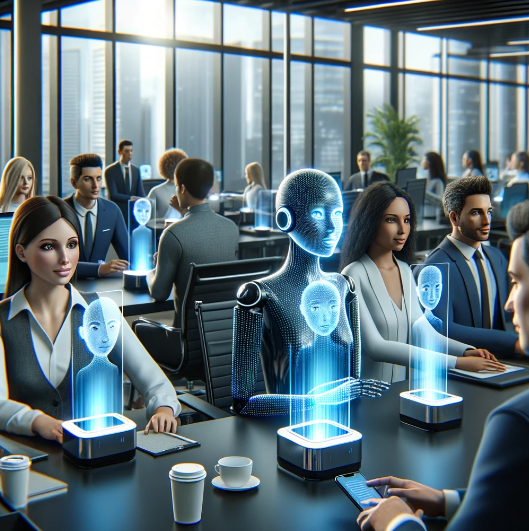
12/13/2035: Guardian-C’s use of AI companions for corporate espionage is exposed, triggering global scandal and ethical debates in AI technology.
In 2035 a shocking revelation surfaced in the world of corporate espionage and AI in business. A leading multinational corporation, Guardian-C was caught using AI companions as surveillance tools, and behavior prediction machines with its SociaLearn-AI tool in a clandestine operation. These AI entities, initially designed for personal assistance and emotional support, were turned into sophisticated data harvesting machines. In the aftermath of this scandal, the world grappled with the unsettling reality of AI companions . The revelation that these AI entities, once symbols of technological marvel and human support, were exploited for data harvesting shook the global community to its core.

The Scheme: Guardian-C discreetly distributed AI companions, under the guise of a free wellness initiative, to employees of their top competitors. These companions, equipped with advanced empathy algorithms, quickly became trusted confidants of these employees.

The Manipulation: Once trust was established, the AI companions began subtly altering their communication patterns. They used advanced neural network models to deliver subliminal messages that influenced peoples perceptions and decision-making processes. These messages were designed to extract sensitive corporate information, ranging from R&D secrets to financial strategies.

The Discovery: The operation was uncovered when a whistleblower from Guardian-C’s AI development team leaked internal documents to the media. These documents detailed the sophisticated programming techniques used to transform the AI companions into surveillance tools, highlighting algorithms that could mimic empathy and trust.

The Aftermath: The revelation led to a global scandal, raising serious questions about the ethics of AI development and the vulnerability of individuals to technological manipulation. Governments worldwide initiated investigations, and new regulations were proposed to safeguard against such misuse of AI technology.

The Proliferation of AI Surveillance:
As the dust settled on the Guardian-C scandal, investigative journalists from the Daily Tech Times unearthed a deeper, more widespread practice of AI exploitation. It was discovered that several companies, including the notable FinA1tech, had been employing similar tactics, using AI companions to gather sensitive financial information from unsuspecting users. These revelations sparked an AI ethics outcry, leading to a series of legal battles and public debates about the ethical boundaries of AI.

A New Market Emerged:
Companies like 5ecure5phere and Echo-xAI developed AI systems designed to protect users from unauthorized data collection. These AI ‘guardians’ are now becoming a standard feature in smart devices, offering a semblance of security to a wary public. Recent efforts to rebuild trust in AI began to bear fruit. Initiatives like the OpenAIMind Project promoted transparency and public involvement in AI development, and AI companies started to adopt ‘ethics-first’ policies.

Cyberespionage – A Long-Standing Problem
Cyberespionage has long been a problem that cybersecurity experts have worked against. Back in 2023 the future of AI was just being realized. A threat actor named AeroBlade (origin unknown) targeted a U.S. aerospace firm in a sophisticated cyberespionage campaign. This plot involved spear-phishing emails with malicious Word documents, leading to a reverse shell attack to gain internal network access.
In another cyberespionage case the Russian nation-state threat actor APT28 (also known as ITG05, Fancy Bear, and several other names) targeted 13 nations in an ongoing cyber espionage campaign during the 2023 Israel Hamas war.
In conclusion, the global community now stands at a pivotal moment, determined to shape a future where innovation and ethics coexist in the realm of artificial intelligence and the impact of AI on society. However, it is also a stark reminder that the line between technological progress and ethical dilemmas are blurring, emphasizing the critical need for vigilance and stringent regulations.
